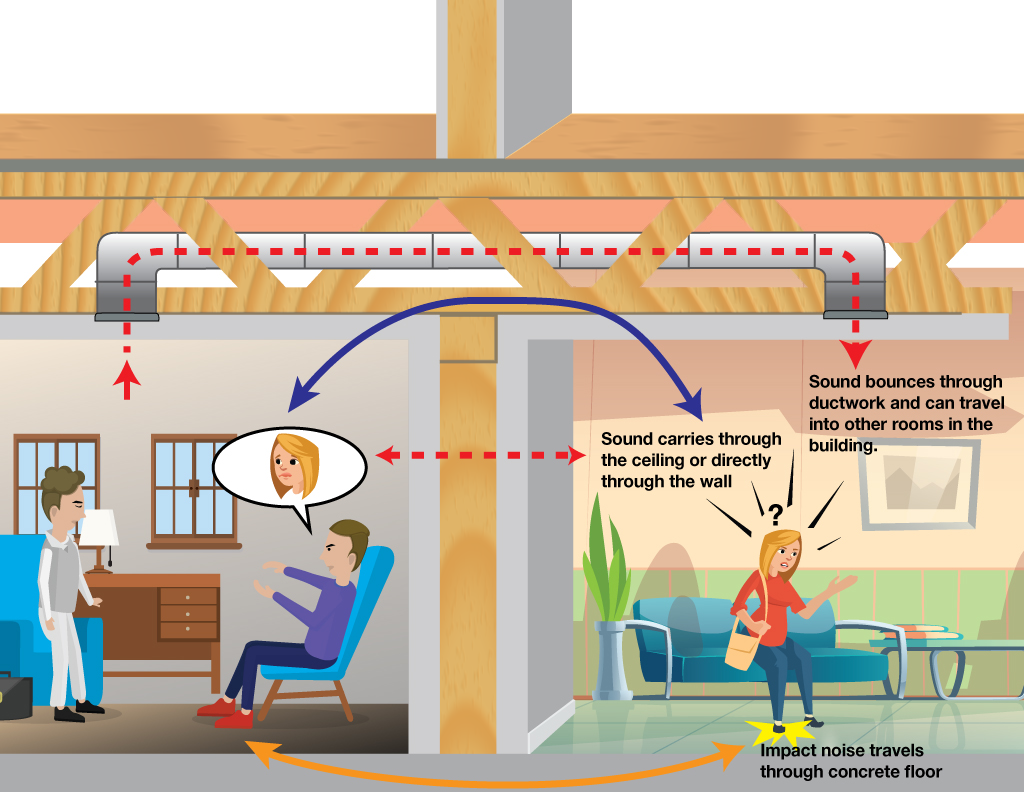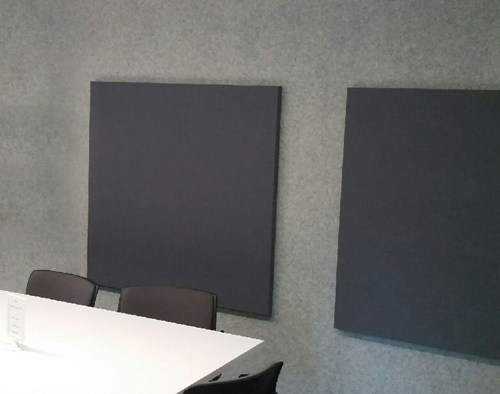Privacy and Confidentiality Problems for Doctors and Patients
When a patient goes to visit a doctor, therapist, counsellor or mental-health professional, they will be sharing private and very personal information. As a medical professional, you are entrusted to safeguard and respect this sensitive information. During the appointment, you want to ensure that your patient feels that they are in a safe space and are comfortable to reveal their problem. Unfortunately, you may not be aware that your therapy rooms may not be secure in terms of patient confidentiality. This article examines some common problems related to how sound can be heard outside the room, how it can disrupt the success of a session and how acoustics can be improved to reduce misunderstandings in conversations and improve outcomes. We’ll also cover some soundproofing solutions to these problems at the end.
Why your private office is not so private:
It is a different world today and your clients have a greater understanding and expectation for a safe space to receive care with a high level of privacy and confidentiality. Part of providing these necessities is ensuring that your sensitive conversations with your clients cannot be overheard outside of the therapy room. The most obvious problem is being able to hear conversations through the walls. Thin walls are very common in medical buildings. Many have been partitioned to fit as many offices as possible to earn more rent for the landlord. If you can hear someone on the other side of the wall, it is pretty likely they can hear you too! Did you know that sound can travel, not just through the walls or doors, but also through ducting and an area above typical office ceilings called the plenum?
This area is used as a shared conduit to circulate air and houses the ductwork for the Heating Ventilation and Air Conditioning (HVAC) throughout a building. It also has the ability to share sound—and therefore, your private conversations. This is a situation that you definitely want to avoid. While there may not be any legal consequences, a breach of patient confidentiality due to something that is easily preventable like this could cause embarrassment, damage to reputation and loss of patients. What would your patient’s reaction be if they knew someone had overheard their conversation?
Unwanted Noise from Outside the Room
Imagine that you are in the middle of a therapy session and your patient is finally comfortable enough to start sharing some really important feelings or information. Suddenly, noise from outside the room disrupts your patient’s train of thought or distracts them. It could be voices in the hallway, a sound from the waiting room or an unwanted noise from the building, like the elevator machinery or water running through the pipes. Many times, these sounds are persistent and not only distracting but are annoying too. When the flow of dialogue is broken, it may be difficult to reconnect with your patient and make progress. Connecting with a patient is hard enough without having to deal with these problems.
Poor Acoustics Adds to Miscommunication
Some therapy rooms are small and sound from your conversation bounces off the hard walls and makes speech sound unclear. There may even be some echo. The directions you give your patient or the story they are telling you may not be understood the way it was intended. Listening is one of the most important parts of therapy and it shouldn’t be a struggle.
What about the Home Office?
During COVID, many professionals are working from home. Of course, this situation comes with its challenges too. There are similar acoustic problems to those at the “real” office. Both you and your patient have to rely on your Internet connection and computer’s audio being reliable. Sometimes, your patient may not have a quiet or private place in their home. They may be a little hesitant to speak because other members of their household may overhear. There is definitely a benefit to providing a quiet, safe space in your business office—as long as it doesn’t have the sound problems mentioned above.
For yourself, finding a quiet space in the house where you can hold your sessions is also required. If other family members are home (including your pets), there may be some unwanted noise coming from outside your office. Those unwanted distractions need to be blocked so you can concentrate. Inside the room, you’ll want decent acoustics so your patient can hear you clearly. Once these issues are looked after, you’ll be all set.
Solutions:
Fortunately, there are soundproofing solutions available for all of these issues—whether you are working from the office or from home. Unwanted external noise can be dramatically decreased to prevent disruptions and distractions. The two types of unwanted noise come in the form of airborne sound and structure-borne impact noise. Since sound energy causes vibration, even through solid objects such as walls, it is possible to decouple the wall or create a separation to disrupt the sound waves. This separation creates a pocket of air that can be further insulated with a dense, sound-absorbing material. That is how to prevent sound from entering the therapy rooms. There are also techniques to apply to the doorway, as this may be an area of concern if it is next to a busy hallway.
Inside the room, special sound absorbing panels can be added to the walls to correct airborne sound transmission. The difference these panels make is amazing. And this is a non-invasive soundproofing method that doesn’t require any changes to your existing walls. It’s quick and doesn’t make a mess. Understanding speech will improve to the point that you will wonder why these panels weren’t installed sooner. Low sounds such as a muttered phrase or quiet speech will be much more noticeable and clearer.
Even HVAC ducting can be treated with soundproofing materials to prevent sound transmission. This includes soundproofing the plenum or shared space above the ceiling. This treatment is really important as sound can travel through this area to other areas in the building, even if the rooms are not adjacent.
Getting it Done: JAD Contracting
Applying soundproofing techniques to therapy rooms is a specialty job and requires experienced and skilful soundproofing installers. JAD Contracting has been providing custom soundproofing, sound absorption and sound control installation for over 17 years. We will assess your patient examination room or therapy room to provide a solution that will maintain confidentiality within the rooms. We will improve the acoustics so that all conversations are easy for patients and doctors to understand. We feel that this soundproofing service will lead to better results in patient care and could reduce wasted time and confusion.
Call us today. We want to make a big difference and help medical professionals give the best treatment they can. After all, we are all patients at some point and deserve a safe place to get the care we need.
JAD Soundproofing:
Toll Free: 1-855-523-2668
Office: (416) 888-0991

Sound travels through more than just the walls
(click to enlarge)

Sound absorbing panels reduce echo
and audible distortion of speech

Confidentiality during a therapy session

Keeping medical information private is critical